News & Events in Belarus
Nuclear power plant as a gift, focus on people, cutting-edge hospital in atomic President’s Week
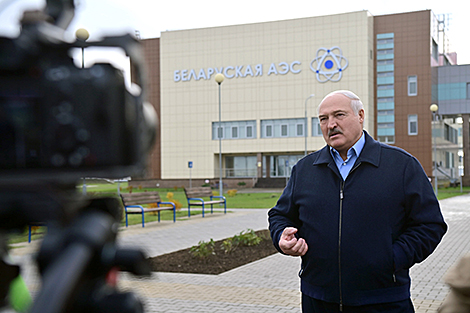
The work schedule of the Belarus president is always full of events. Aleksandr Lukashenko holds conferences and working meetings on the most topical matters concerning the country’s development, regularly visits the regions, goes on foreign trips and welcomes foreign guests, talks to reporters, signs decrees and laws. And even if there are no public events, it does not mean that the head of state does not work. It must be said that even when he relaxes, for instance, by playing ice hockey or chopping firewood, Aleksandr Lukashenko happens to find the time to give yet another instruction. All the decisions must be prompted by life, he likes to say.
The President’s Week project is intended for those, who want to keep up with the head of state, be up-to-date on the latest statements and decisions of the Belarusian leader.
Why has cooperation with some post-Soviet republics been developing “any old way” up till now? What instructions did Aleksandr Lukashenko give to fix the situation? What is Belarus ready to share with Kyrgyzstan?
Is the president ready to restore the system of military prosecutor’s offices in the country? How is the discussion about the possibility related to the situation in the region and around Belarus?
What was the key point of Aleksandr Lukashenko’s phone conversation with President of Russia Vladimir Putin this week?
Details of nuclear industry affairs in the work schedule of the Belarusian head of state: what does the Belarusian nuclear power plant mean for Ostrovets District and the country as a whole? To whom and on what occasion did Aleksandr Lukashenko gift the nuclear power plant? Will there be excessive supply of electricity? How will it be spent? How much money has Belarus saved from the Russian loan granted for building the Belarusian nuclear power plant? Will there be another nuclear power plant in Belarus?
Relations with western neighbors, a prophecy concerning Ukraine that is coming true, and what should be done about Lithuanian notes.
These and other matters are covered by the new episode of BelTA’s special project President’s Week.
ROADMAP. What did Belarus lack in cooperation with Kyrgyzstan and other countries?
Belarus President Aleksandr Lukashenko met with Ambassador Extraordinary and Plenipotentiary of Kyrgyzstan to Belarus Ermek Ibraimov in Minsk on 30 October.
The meeting with the Kyrgyzstan ambassador was held in connection with the completion of his diplomatic mission in Belarus, this is why Aleksandr Lukashenko asked him to remember Belarus and to promote further cooperation with the country in his new post. “If you continue to serve in the Ministry of Foreign Affairs of Kyrgyzstan or work somewhere else, please remember it. Give a tip or a consult,” the head of state said.

“I strongly hope that the 4.5 years that you have spent working in Belarus will be a good stepping stone in your career. You will always remember this time here. Well, it is natural. The most important thing is for you to have good recollections of our Belarus. I think we are friendly people. We are hospitable people just like the people of Kyrgyzstan are, by the way. Therefore, you will remember with kind words the years of your diplomatic service in Belarus. We strongly hope that wherever you work in the future, you will be truly our man, you will promote the interests of Belarus in the interests of Kyrgyzstan, of course,” Aleksandr Lukashenko told Ermek Ibraimov.
Shortcomings in interaction with post-Soviet republics
The head of state noted that he often thinks about the interaction of Belarus with the post-Soviet republics. Taking Kyrgyzstan as an example, he usually comes to the conclusion that cooperation with the republics proceeds “any old way”: “Something is left over from the Soviet period. For example, we used to buy sugar beet seeds from you. We continue to do so. Because we are satisfied with the quality and so on. But we have yet to work out a permanent plan, a roadmap to guide Belarus’ cooperation with republics of the former Soviet Union. Well, with those who want to cooperate with us.”
At the same time the same approach is used in cooperation with other countries, including remote ones. “We make separate decisions with regard to cooperation with individual countries. For example, we issue presidential decrees on cooperation with Russia, China, and so on,” the Belarusian leader remarked.
Aleksandr Lukashenko assumed that the approach to cooperation with post-Soviet republics is to blame: “Well, on the other hand, they are already our cousins, we will always have good relations with them. On the other hand, we need such roadmaps.”
“Our Ministry of Foreign Affairs needs to put together country plans to guide mutual relations, especially with Kyrgyzstan. We have something to offer to Kyrgyzstan. They have a lot of things that we need. We definitely need such ties,” he stressed.
Bilateral prospects
The Belarusian leader said: “As for our relations, certainly, we had some $170 million in trade last year, but it is nothing if we talk about trade between the countries. We have such trade figures with many provinces of Russia and even much more than that. Therefore, we need to increase trade with Kyrgyzstan.”
The head of state stressed that shipments of the necessary machines, vehicles, and equipment, joint manufacturing in Kyrgyzstan can be extended as far as product choice is concerned. Manufacturing cooperation projects are being implemented there now to jointly make elevators and power transformers.
“We can produce everything in your country and teach technologies to your people. We can share the technologies that you haven’t had before. Technologies concerning transformers, elevators, tractors, automobiles, and so on. You know what we can produce. For Kyrgyzstan, the level of technological equipment of a country like Belarus is rather high. We are ready to share these technologies,” the president stated.
Aleksandr Lukashenko remarked that it is due to the division of labor and to the placement of manufacturing facilities in the Soviet Union: “You did some things and we did other ones. Now these technologies are in demand in Kyrgyzstan. We are ready to share them.”
The diplomat noted that he fully shares the opinion of the Belarusian president on bilateral trade. Indeed, when looking at the absolute figures, they may not seem so large, but in relative indicators, there is a positive trend: $160.2 million in 2022 (an increase of almost 65% over 2021) and $103.3 million in January-August 2023 (up by 24% year-on-year). “If we look at the relative figures, the percentage of growth, the trade inspires some optimism,” the ambassador said. “Considering the fact that this trend continues…”
“Are you saying that over the past three years our trade has increased by 2.5 times?” Aleksandr Lukashenko asked. “That’s true.”
PHONE CALL. Key point of Aleksandr Lukashenko’s conversation with Vladimir Putin
On 1 November Aleksandr Lukashenko talked to President of Russia Vladimir Putin over the phone.
The forthcoming summit of the Collective Security Treaty Organization heads of state in November was the key point of the conversation. Belarus presides over the organization now. The two leaders discussed bilateral cooperation while focusing on the main avenues of cooperation, including power engineering and import substitution projects.
Aleksandr Lukashenko and Vladimir Putin also compared notes about topical items on the regional agenda and the international one.
TO BE OR NOT TO BE. Will the military prosecution system be restored in Belarus?
On 2 November the president hosted a government conference to discuss the possible recreation of military prosecutor’s offices. “I will not describe the situation in the world: you know it very well. You are also aware of the situation at our borders. Before we start the discussion, let me just remind you that in 2014 we made a decision to liquidate the system of military prosecutor’s offices,” Aleksandr Lukashenko said to open the meeting.
The authority to oversee the administration of justice in the Armed Forces, other forces, and military formations in Belarus was transferred to the civil branch of the prosecution service. This decision was made in different conditions and was aimed, among other things, at reducing the number of staff as part of the reform of the state apparatus and cutting down budget expenditures.
“At a larger meeting held in 2014 we decided to reduce the number of military prosecutors. I am not going to remind you what had caused it, the motivation. But a natural question arises: has the situation changed in the field where prosecutors are supposed to oversee the uniform and precise observation of our laws, the legislation? I guess it has. Then one starts wondering: has it changed so much that we need to recreate the military prosecution system?” the president said.
As an effective measure to accomplish these tasks the prosecutor general proposes to establish the Chief Military Prosecutor’s Office and inter-garrison military prosecutor’s offices. “We need to make a decision on this matter,” the Belarusian leader stressed.
Aleksandr Lukashenko inquired about the practices in other countries. He also noted that there are the alternative opinions regarding the advisability of creating a system of military prosecutor’s offices: such structures are necessary, but only in wartime conditions.
“God forbid, a war begins and we quickly set up the prosecutor’s offices. Can’t we do without them? If the answer is no, then maybe we should proceed with it. If we can do without them, then why we need them? And the main thing: why has this issue been raised? Primarily by prosecutors? And the key question: do we need to recreate the prosecutorial oversight system that existed before 2014 or not? I’ve invited you here to discuss these issues, to make the decision,” the president said.
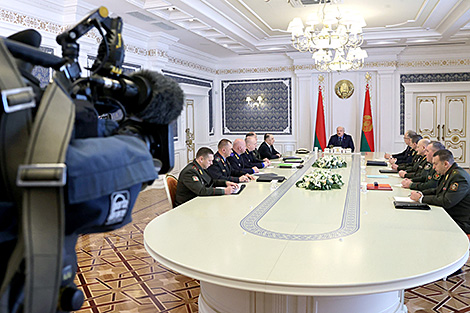
Prosecutor General Andrei Shved noted that the prosecution service is working to improve the overall efficiency of oversight across the board. A number of the agency’s initiatives have been implemented thanks to support of the head of state and have produced results. “In connection with the current military and political situation near our borders, we have analyzed how oversight over the rule of law in foreign armies is organized, including during military conflicts. Military prosecutors are an indispensable element of the national security system around the world. Their services are needed and used in all military conflicts,” the official said.
Summing up results of the conference after the items on the agenda were discussed, Aleksandr Lukashenko remarked that it is too early to make the decision on setting up the military prosecution system. There is no need to rush ahead with it because there is nothing extraordinary about the situation, he stressed.
However, it is necessary to improve prosecutorial oversight and improve its effectiveness, including in army units. According to the head of state, the Prosecutor General’s Office has to work out the foundation of this future system (prepare personnel, understand the format of the work, establish interagency interaction) in order to promptly make the relevant decisions in due time.
A GIFT TO THE NATION. Why is the Belarusian nuclear power plant important for the country?
On Friday, 3 November Aleksandr Lukashenko went on a working trip to Ostrovets District, Grodno Oblast and visited the Belarusian nuclear power plant where the second unit had been accepted for commercial operation. The nuclear power plant is completed. It became kind of a gift for the residents of the region and for the entire Belarusian nation ahead of October Revolution Day, which is marked in Belarus on 7 November as a state holiday.
We will revisit the matter of the holiday and the symbolism of the event in Ostrovets but it should be noted that Aleksandr Lukashenko focused on the matter of the Belarusian nuclear power plant and on making electricity more affordable for the population not only at the end of the work week but also on Tuesday, 31 October. He received the relevant report from Deputy Prime Minister of Belarus Piotr Parkhomchik, who oversees this industry, and Belarusian Energy Minister Viktor Karankevich in the Palace of Independence. Deputy Head of the Belarus President Administration Maksim Yermolovich was also present.
Aleksandr Lukashenko stressed that the safety of the nuclear power plant is a number one priority and gave instructions to polish off all the quirks in cooperation with Rosatom. “After the Chernobyl catastrophe even the slightest leniency during the construction of the nuclear power plant cannot be tolerated. People will never forgive us for it. That is why we have such strict requirements for various minor details. But as far as I know, the main modules, including the nuclear island, are fine. It is functioning and operational. Well, the minor details should be polished and brought into compliance,” the president said.
Although the construction of the nuclear power plant has been completed, its commissioning had been delayed slightly because of the Russian side. According to the contract, Belarus raised the issue of compensation for the delay. “There is no need to hide it. There is nothing extraordinary about it. We raised this issue as the deadlines were not met and the Russian side was responsible for this. They offered us options such as Russian domestic prices for fresh nuclear fuel. And a warranty period of five years [for the main modules],” the head of state noted.
Aleksandr Lukashenko asked the officials whether Rosatom’s concessions satisfy the Belarusian side. He warned that there is no need to stress Russians too much about it.
Focus on people and “electric wonder”
The head of state remarked that more electricity will be generated in Belarus because the nuclear power plant has been commissioned. “On the whole, we had plenty of electricity for the manufacturing sector, for agriculture, and for people to a certain extent. We are getting some reserves now. I won’t say they are excessive,” Aleksandr Lukashenko said.
He stated that electricity consumption will rise and there is a focus on supporting the people. For instance, by encouraging the use of electricity for heating residential buildings. “We put focus on support for our people. We looked at the heating of the town that Deputy Prime Minister Sivak is building [in Novaya Okolitsa outside Minsk]. I’d say it is a miracle. Clean and neat. No comparison with gas boilers and heating. Far cry from coal and the rest. Our climate is changing. It is very important for us,” the president said.
The head of state stressed that using electricity to heat residential buildings is not only profitable. It is also a clean and safe technology.
“Therefore, it was the right decision to encourage people to use electricity. And the prices are acceptable. People say that it is even cheaper than gas heating. These are incomparable things. But we are underperforming a bit as far as the power grid is concerned,” Aleksandr Lukashenko remarked.
At present it is impossible to satisfy about 10-15% of the corresponding applications filed by citizens. The head of state was assured that systemic work was in progress to resolve the problem. Although a lot has been done, it is not sufficient because there is a massive increase in demand on the part of the population.
“This is why it is necessary to increase the throughput capacity of the power grids. Bluntly speaking, this wire needs to reach people’s houses. We need to do this since we have promised it to people. Yes, the demand has increased dramatically. It is natural. People are not stupid. They see and feel that this is a very profitable matter. But we have enough electricity. We need to help our people. We live and work for helping the people,” the Belarusian leader said.
The expansion of the use of electric vehicles should be viewed from the same angle. “We are putting more and more efforts into electric transport. It is also the right thing to do. It turned out that we realized it in time and started developing it,” Aleksandr Lukashenko remarked.
At the same time the president pointed out that despite the availability of reserves the other power-generating facilities should not stay idle or be used in so-called cold mode. As an example he mentioned the Bereza and Lukoml state district power stations. The head of state was told that quite good options are available for keeping the facilities busy. And they are very profitable for the state. Instructions were given to continue this work.
Symbolism and importance of the gift to the people
On Friday Aleksandr Lukashenko not only visited the Belarusian nuclear power plant where he received a symbolic passport of the nuclear power plant. He also went to the nearby town of Ostrovets where he was made familiar with the social and economic development of Ostrovets District, examined the local hospital that had been fitted with all the necessary modern equipment, and talked to residents of the town.
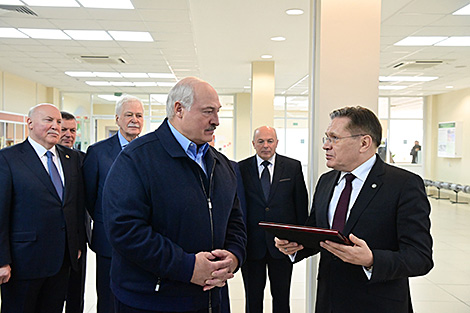
The head of state remarked that back in the day when state holidays were being chosen, the government decided to leave October Revolution Day in the calendar of festive dates. But Aleksandr Lukashenko was in favor of filling it with some meaning. Inaugurating landmark facilities ahead of such holidays as a gift to the nation was a Soviet custom. This tradition is still observed in sovereign Belarus. “I cannot say it has taken root by 100% but people are getting accustomed to it. You may have noticed that we try to inaugurate some facilities ahead of these celebrations. Mass media cover it well,” the Belarusian leader remarked.
Since Aleksandr Lukashenko personally initiated the construction of the Belarusian nuclear power plant back in the day, he came to Ostrovets District for the final opening of the nuclear power plant in order to make this gift to the people. He stressed that it is the most up-to-date and safest nuclear power plant. “It is a normal facility. I cannot say it is more dangerous than others. But you have to operate it responsibly,” he remarked.
The head of state noted that the construction of the Belarusian nuclear power plant had helped infuse this northwestern land with life among other things. The president recalled that the custom had started in previous years – top-ranking officials from Grodno primarily focused on territories around Grodno. This is why as he appointed Vladimir Karanik Grodno Oblast governor, Aleksandr Lukashenko asked him to also pay attention to areas beyond Grodno. Naturally, the construction of the Belarusian nuclear power plant has allowed Ostrovets District to enhance and build up human capital and become a regional leader in some parameters.
The Grodno Oblast governor told the president: “Ostrovets has changed radically. It is a different district now. It was a small agricultural district in 2010, with the share of agriculture at 51%. The rest was trade and a bit of civil engineering. In January-September 2023 the share of the manufacturing sector was 90%. The district has changed its face and has changed the face of the oblast.”
A huge amount of work has been done to develop the district’s infrastructure. As much as Br467.5 million has been invested in it. These are unprecedented investments in human capital. In 2010 the birth rate in the district was nearly 2% below the oblast’s average. Now it is 30% above it.
But the most important thing is the Belarusian nuclear power plant. It represents the foundation for the future development of the country. “I understood that there are no prospects without clean energy, that we will be unable to develop without electricity,” the president said. He once again mentioned the housing estate construction project in Novaya Okolitsa and plans to develop the throughput capacity of power grids.
On the whole, nuclear energy industry is one of the economy branches that radically alter the image of the country and the level of its development. The space technologies industry that Belarus develops together with Russia does the same. The recently inaugurated manufacturing facility of the Belarusian National Biotechnology Corporation with China’s aid is worth mentioning, too.
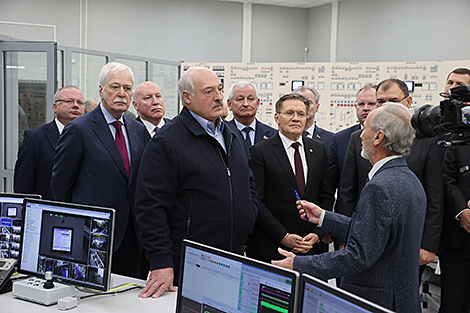
“We’ve built [the Belarusian nuclear power plant]. A good power plant. It is the future. Naturally, this land will always be in the center of attention. It will develop,” the head of state said. “Three years ago as I was launching the first unit, I said that a historical day had come: the age of peaceful atom began. Today we are also a nuclear power because of nuclear weapons. And indeed, by receiving this magnificent facility as a gift ahead of 7 November in the complicated year of 2020, we did the right thing by creating this wonder.”
The president pointed out that benefits of the nuclear energy industry are obvious: it will allow the manufacturing sector and agriculture to work more effectively and will make life of Belarusians more comfortable thanks to cheap electricity.
By the way, Rosatom Director General Alexey Likhachev assured that the Belarusian nuclear power plant will operate for at least 60 years but there are reasons to believe that the service life may reach 100 years. In his words, Russian specialists built the Belarusian nuclear power plant as if it were a Russian one and would treat it the same way during the operation stage, including warranty service, the availability of spare parts, the organization of repairs, personnel training, and so on.
Golden opportunities for Belarusians and discussion about the second nuclear power plant
The Belarusian nuclear power plant has just been commissioned but Aleksandr Lukashenko already wonders about future possible steps to develop the country’s nuclear energy industry. Purely as a theory for now. But knowing the Belarusian president, the transition from theory to practice may not take long. Moreover, certain financial resources are available: Belarus saved a significant amount of money from the Russian loan granted for building the nuclear power plant without detriment to the nuclear power plant’s quality.
But first things first. The possibility was first raised at a government conference held on 31 October. The discussion proceeded behind closed doors. “We are considering building the second nuclear power plant as a possibility. I would like to hear your point of view on that,” the head of state said.
On Friday as he visited the Belarusian nuclear power plant, Aleksandr Lukashenko noted that he had raised the matter of building new nuclear-powered electricity generation facilities for three times already. As he talked to Rosatom Director General Alexey Likhachev, Aleksandr Lukashenko wondered whether a third unit can be built at the site of the Belarusian nuclear power plant if need be.
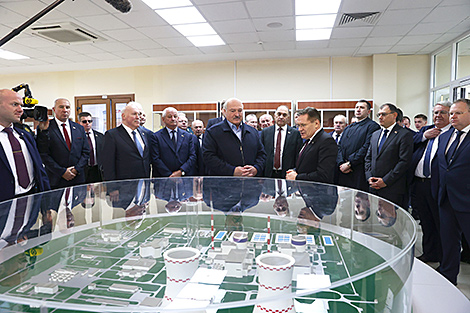
The Rosatom head noted that building another unit of the Belarusian nuclear power plant will not be a problem as far as construction is concerned. It is possible to further develop the site. “We actually look at the energy system between Russia and Belarus as very complementary if not united. In this regard our energy ministries, our governments should work out a plan,” Alexey Likhachev explained.
Belarus saved part of the Russian loan granted for building the Belarusian nuclear power plant. Later on Russian reporters asked the head of state what the remaining part can be spent on considering healthy Belarusian pragmatism.
Aleksandr Lukashenko said: “Since we took less, we will have to repay less.” In his words, the possibility of doubling the output capacity of the nuclear energy installations is being discussed in Belarus for now. “We would like to double it. Then Belarusians will be golden,” he said.
As a possible way of implementing this idea, the president mentioned the construction of another nuclear power plant at a different site in Mogilev Oblast and the construction of the third unit at the site of the Belarusian nuclear power plant. “[Building the third unit] will be significantly cheaper. It will increase the output capacity by half,” the head of state noted.

“The key thing for me was not only building the nuclear power plant but having the competences that Russians have. We’ve acquired them,” he stressed. Aleksandr Lukashenko remarked that he had once agreed with the Russian president to discuss what should be done to the saved credit resources once the construction of the Belarusian nuclear power plant was over.
As he was answering questions from residents of the town of Ostrovets, Aleksandr Lukashenko expanded on the topic: “We have to make calculations to determine where we should build it. Building it here may be the cheaper option. Because in addition to building [the nuclear power plant] itself enterprises, which forged and welded parts and components, have been built. Transporting the parts is not a big problem but it will be cheaper to make them on the spot. If we decide to build it… The decision has not been made yet, it is being discussed. But it is good that you’ve realized that we need it, that it is the future. If we decide to build it, then I will report it to you and will consult with you before making such a decision. Today’s supply of electricity will be sufficient not only for the duration of my life. It will be sufficient for your kids, too. But who knows how the world will develop? The second nuclear power plant may come in handy. I am in favor of it. This is why we are discussing the possibility.”
The head of state also specified how much money had been saved during the construction of the Belarusian nuclear power plant: “They gave us a very lucrative loan. The day before I talked to Putin. Out of the $10.5 billion they have loaned us we’ve spent only $6 billion. Wisely. We can use the remaining sum to build nearly two units [of a nuclear power plant], as a matter of principle. This is why we can use this source of funding, the money that we’ve saved.”
An excellent hospital in Ostrovets
The president was made familiar with the operation of the Ostrovets District Central Clinical Hospital. Chief Physician Vladimir Mozheiko informed the president about the hospital’s operation in detail.
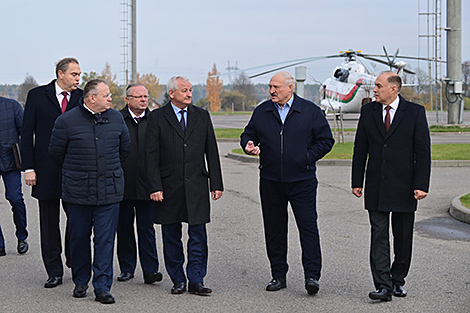
“Vladimir Stepanovich [Karanik, Grodno Oblast governor] says that you live as if in outer space. The hospital is so advanced,” the president noted. He went to the departments of diagnostic radiology, physical therapy, and transfusiology.
“What is there to talk about? A magnificent hospital,” Aleksandr Lukashenko opined. “I wanted it to be this way. I wanted it to be one of the beacons, a facility to demonstrate how we will build and maintain other ones.”
The Ostrovets District Central Clinical Hospital comprises a stationary diagnostics and treatment complex, a polyclinic, a nursing care hospital with general practitioner’s ambulatory clinic, three general practitioner’s ambulatory clinics, 15 rural health posts, a health post at premises of the Belarusian nuclear power plant construction site, and a health post at the state enterprise Belarusian Nuclear Power Plant. The hospital caters to the population of its own district and acts as an interregional and interdistrict diagnostics and treatment center.
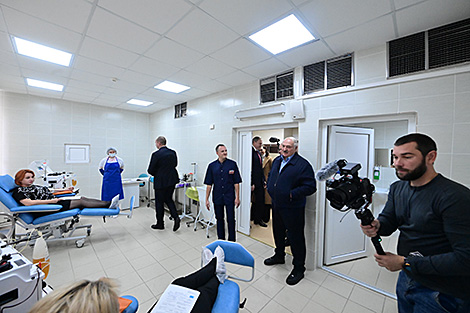
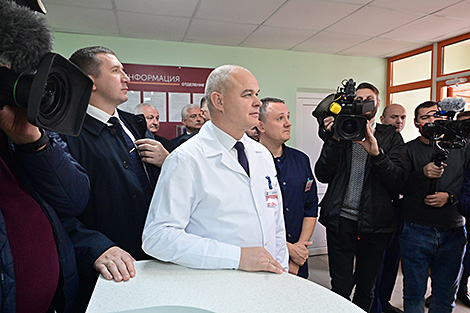
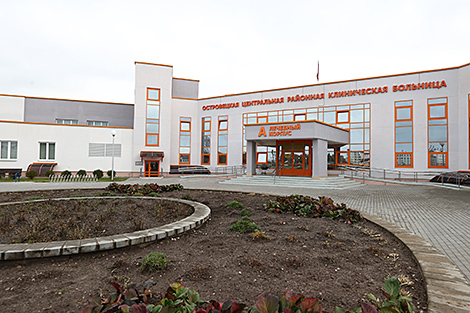
Aleksandr Lukashenko stressed that the system of operation of healthcare institutions of various levels is an important matter. The president has repeatedly paid attention to it recently. “We need no frills. But we cannot take them away without due consideration. Rural health posts and so on. They have to stay where they are needed,” he said.
A gigafactory, a nuclear medicine center, and other prospects of cooperation with Rosatom
As he visited the Belarusian nuclear power plant, the head of state raised the matter of future cooperation with Rosatom. “I don't want you to leave Belarus,” he told Rosatom Director General Alexey Likhachev.
“We don't want to leave either,” the Rosatom head replied.
Alexey Likhachev praised the effective work at the Belarusian nuclear power plant site together with Belarusian specialists. He invited Belarus to join Rosatom’s foreign construction projects. Belarusian companies and specialists are already taking part in the construction of a large nuclear power plant in Egypt, and there are agreements on their possible participation in the construction of a nuclear power plant in Hungary.
“As we expand our presence in the global market, we will be going forward hand in hand,” Alexey Likhachev assured.
He stressed and the Belarus president backed him up that when making plans for the future, one should not think in terms of decades but look 60-70 years into the future. For example, it is already evident that more electric vehicles will be in use and will need more electricity. In this sense sustainable green nuclear power is the basis for electric transport. “You need appropriate recharging stations, mechanisms. We have a lot to learn from Belarus in this regard. You are moving forward in this regard,” the Rosatom head said.
In this regard Aleksandr Lukashenko said that he had discussed with Russian President Vladimir Putin the electrification of the motorway from Brest to Kazan and further on – the development of infrastructure for electric transport. All the more, technology in this area is advancing. “[Deputy Prime Minister of Belarus Piotr] Parkhomchik together with your power engineers has already learned how to recharge an electric bus on the move. It is enough for the bus to drive a kilometer and a half with the lifted pantograph to recharge the battery. It is a great progress in general. We have to keep moving,” the head of state said.
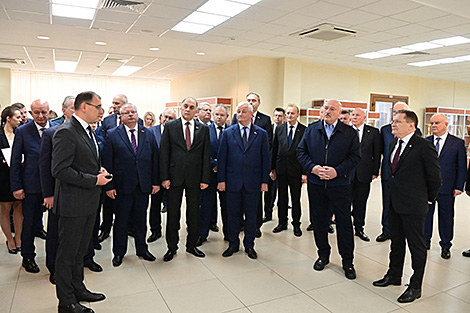
Alexey Likhachev mentioned a number of proposals on advancing cooperation with Belarus and not only in the sphere of nuclear technologies. For instance, it is possible to build a gigafactory in Belarus. Russia has already built a gigafactory of its own. It makes storage devices and key electronic components for electric vehicles. Given the active development of the electric transport sector, it is impossible to implement such a project in Belarus as well. “We have localized the production, the technology. We are adapting it as much as possible to the Russian technological landscape. We have already started deliveries to you. Traction batteries for BelAZ, Belkommunmash, and MAZ,” Alexey Likhachev said.
Since Belarus is a machine-building country, he proposed a solution for the so-called bogie - the entire platform which includes the charger, the engine and the control system. “We see it as particularly important to concentrate this production in one place,” the Rosatom head explained. “It would be the right decision to follow the path of manufacturing localization and set up a gigafactory here [in Belarus].” According to him, a gigafactory in Belarus is “not a dream, but a feasible task”.
By the way, as he talked to Ostrovets residents later that day, Aleksandr Lukashenko hinted that the progress in creating a Belarusian electric car will be revealed to the public soon. At least a deputy prime minister had promised to surprise the president the day before. “I said: have you finally made an electric car? ‘Well, we will show it when you come’. This is why let’s wait. He said it will happen soon, in December. But I know that they are making an electric car. The body will be like Geely’s. It is a good one. People like it. As for electrobuses and the rest, electric trams, we already have them. They sell all over the world,” the head of state noted.
Another area where Rosatom is ready to share experience and technologies is the development of a nuclear medicine center in the country. According to Alexey Likhachev, the creation of such a center can become one of the Union State projects.
There are prospects for cooperation in other areas as well, including manufacturing sector, digital and additive technologies. The Russian state corporation already cooperates with Belarusian scientific and healthcare institutions in a number of areas. For example, linear accelerators for remote therapy are supplied. Alexey Likhachev suggested including Belarusian healthcare institutions in the supply system of the most advanced radiopharmaceuticals.
“We offer (and the first steps have already been made) to open a center of additive technologies in Belarus. This is tomorrow’s machine building, and we need to train personnel, assimilate technologies. There is still a lot of work to do,” Alexey Likhachev said.
He touched upon the development of digital technologies in Belarus and admitted that five years ago he was surprised to learn that the competencies of a number of Belarusian enterprises exceeded the level of Rosatom. The state corporation has organized joint projects with some of them.
Some of the proposals for joint activities included industrial waste management, development of alliances in the wind energy sector.
Alexey Likhachev added that plans were in place to draft an intergovernmental memorandum and programs with Belarus.
NOTE FROM CRAZIES. Aleksandr Lukashenko dismisses Lithuania’s complaints about the Belarusian nuclear power plant
Russian reporters also asked the president about Lithuania’s note regarding the commissioning of the second unit of the Belarusian nuclear power plant. Aleksandr Lukashenko said: “Those crazies sent a note. The people of Lithuania has nothing in common with these crazies. Trust me, I know what is going on over there. People at the top live all by themselves. I know even grandfathers and parents of those, who govern Lithuania now.”
He recalled that he had once invited specialists of the Ignalina nuclear power plant Lithuania had shut down to work in Belarus and had offered cooperation without a grudge. “But they [Lithuanian authorities] pursued a different policy upon bidding of certain people from across the ocean. It is not the first note. They can keep sending them. We can use them as toilet paper. This is why keep them coming,” the president remarked.
Aleksandr Lukashenko stressed that the process of construction of the Belarusian nuclear power plant had been absolutely transparent. The International Atomic Energy Agency has also confirmed it. Foreign reporters were also invited.

“If they don’t want it, then we don’t care. We don’t really stress about it,” he concluded.
Aleksandr Lukashenko made a few remarks in the same manner as he talked to Ostrovets residents.
UNAVOIDABLE. Prospects of restoring normal relations with Poland and Lithuania
One of the questions asked by residents of Ostrovets District concerned the possibility of restoring Belarus’ relations with neighboring Poland and Lithuania, especially given the fact that elections have recently taken place in one of these countries and elections are about to take place in the other soon. Aleksandr Lukashenko was asked whether voters in Lithuania would be able to make their government work in the interests of their state rather than dance to the tune of Washington or Brussels.
“I have absolutely no doubt about it. We will restore our ties with both Lithuania and Poland. It is unavoidable. The main principle is that neighbors should not be at odds with each other. I always say that neighbors are given to us by God, we cannot pick our neighbors,” Aleksandr Lukashenko said. “Disagreements happen, but they are all temporal. Time will come when we will live together as we always have, including the Soviet times…”
The head of state emphasized that Belarus was not to blame for the current relations between the countries, although Lithuania, for example, had voiced various claims and complaints, including with regard to the construction of the Belarusian nuclear power plant. “I told them then that we were going to build this plant no matter what. Neither Americans, nor Europeans nor anyone will prevent us from building it. We decide what to do on our land. And we have built it,” Aleksandr Lukashenko said.
Moreover, Belarus has always expressed readiness to hire nuclear power plant specialists from Lithuania and also supply electricity to the country. “I offered all this to them. But you are right, they are not the ones who run the country,” the president said.
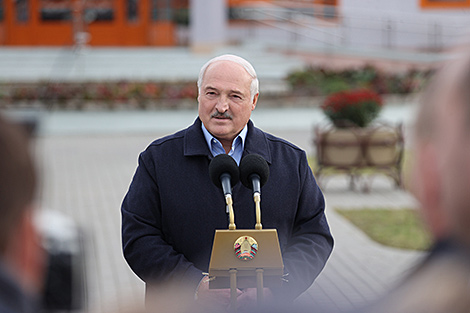
The president added that he did not expect any big changes in Poland’s policy due to Donald Tusk rising to power. Aleksandr Lukashenko called him a pro-European politician while Law and Justice (PiS) was more of a pro-American party. “But it does not mean that tomorrow the policy towards Belarus will change there. We communicate through back channels, and they impose conditions on me demanding to let someone go. This person broke the law, how can I let him go? There should be certain conditions for this,” the head of state said. “We are a sovereign independent state. We will pursue the policy that is in the interests of our people. That’s all there is to it. If they are ready to accept this, tomorrow we are ready to shake hands and resume cooperation.”
Aleksandr Lukashenko is convinced that sooner or later the neighboring countries will restore relations with Belarus.
The reporters also asked the president about the export of electricity generated by the Belarusian nuclear power plant. Selling it to western neighbors as well was the original idea.
Aleksandr Lukashenko stated that things tend to change. “And I am sure that the key principle of a buyer is to buy cheap but quality products,” he said.
The head of state believes that terms of sale of electricity would be attractive to Lithuania and Latvia, for example.
UKRAINE WILL BE OURS. What did Aleksandr Lukashenko warn Vladimir Zelensky about?
While talking to Ostrovets residents, Aleksandr Lukashenko noted that Ukraine has been overshadowed by the deteriorating Middle East situation. He said: “Ukraine will still be ours. Nobody needs this Ukraine. A bit of mayhem in the Middle East… I warned him when the war started. I called [Ukraine President Vladimir] Zelensky: ‘Volodya, listen to me, I am an experienced man, I’ve worked for years. As soon as some mayhem begins, you will be forgotten.’ And then what happened? Ukraine is now overshadowed [by the deteriorating Middle East situation].”
The president went on saying: “You have to think with your head before getting the country involved in some reckless scheme.” He referred to Afghanistan as an example. American troops have withdrawn from it. “They left it out to dry and went away. Exactly the same will happen here. They [the USA] are far away, they are big, they don’t need it absolutely. Their policy focuses on mudding the waters. They like starting something in these muddy waters… You know, it is good fishing in troubled waters. It is their policy. The rest is expendable just like Ukraine today.”
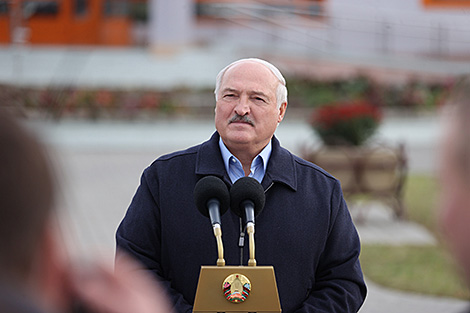
Aleksandr Lukashenko continued: “This is why this region [Ukraine] is our region. I mean that we will be together.” In his words, Europe will crawl back to Belarus and Russia sooner or later. “Because Americans are tearing Europe apart any way they want today. And Europe cannot resist because everything depends on the American market – loans, properties, and the rest,” he said.
Apart from that, politicians over there often behave contrary to interests of their nations and countries. “You see what kind of politicians they are. I look at them as an experienced man, I sometimes want to weep,” the head of state noted. “They don’t even think about their people. They get imprisoned once or twice. Then they steal, pocket their gains and run away somewhere. Just like Zelensky is getting ready to push off, they say.”
As he was answering questions of Russian reporters, who wondered about old plans to export Belarusian electricity to neighboring European Union countries, Aleksandr Lukashenko mentioned Ukraine. It will be necessary to rebuild the country sooner or later. A large amount of work will have to be done. Electricity will also be necessary. “We will not get away from Ukraine. We will have to work in Ukraine. No Americans, the West will help them. Vladimir Vladimirovich [Putin] and I talk a lot about it. They [Ukrainians] will come to us for aid. A huge amount of work. We will have to help Ukrainians,” Aleksandr Lukashenko said.
DON’T FAIL PEOPLE. Why does Aleksandr Lukashenko often interfere in minor problems?
Another matter raised during the conversation with people in Ostrovets drew attention to how Aleksandr Lukashenko had acted after participants of a shared-equity construction project in Minsk recorded a video citing their grievances and addressed it to the head of state.
According to the head of state, he gets a lot of various queries and petitions. He responds to some of them publicly. In this case the president watched an online video recorded by people, who participate in a shared-equity construction project and were unhappy about rising construction prices.
Aleksandr Lukashenko immediately responded to it by calling the Minsk mayor and giving instructions to resolve the situation. “I told him: why are you wronging people? Why no measures have been taken? The contract was signed with one of the districts [of Minsk] and then it was transferred to the Capital Construction Office of the Minsk City Executive Committee,” the president said.
After discussing the problem Aleksandr Lukashenko gave instructions to do everything in strict compliance with the contract. Briefly describing the explanation given by the city official, the president said: “He told me about inflation, higher prices for materials… Do you have the relevant clause in your contract? No. Then go and build things according to the contract. If you had incorporated this clause, people may not have complained so much. People were complaining that the state does not abide by the signed contract.”

At the same time Aleksandr Lukashenko pointed out that such problems should be handled at a lower level. “It is becoming a norm among Belarusians: let’s record [a video address], we will release it, and the president will resolve the problem. It is not even a problem for the oblast governor to handle. It is a problem that should be handled by those, who signed the contract,” he noted. “There are matters that the president has to handle: a nuclear power plant, space technologies, and so on… How to supply you with natural gas, oil and so on for the winter. How to sell, organize things…”
The head of state remarked that the incoming information about various problems also contains a lot of lies. Particularly if the information comes from the opposition’s web resources. “They do it specifically in order to agitate the people,” the president said.
Nevertheless, all the information about various problems gets analyzed and gets responses. Aleksandr Lukashenko personally looks into some of them. He explained why it is important for him. Since his first presidential election when people put their trust in him and took certain risks, he remembers that he should not fail the people. This is why he makes such harsh demands with regard to pricing practices and many other issues.



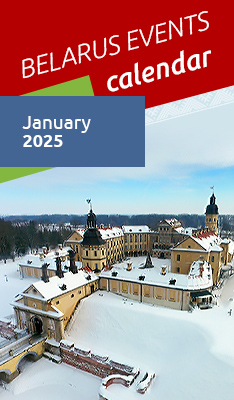




 print version
print version make home page
make home page add to bookmarks
add to bookmarks

